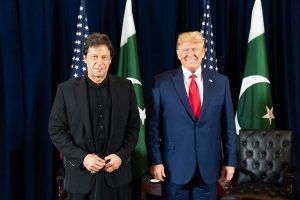As the announcement of Donald Trump’s election as president of the United States for a second term reverberates globally, leaders from Pakistan have swiftly extended their congratulations. Prime Minister Shehbaz Sharif characterized Trump’s win as a “historic second-term victory,” reflecting an immediate alignment with the incoming administration. The prompt response underscored a sense of urgency within the Pakistani leadership to establish rapport and signal support for Trump’s presidency.
Former Prime Minister Imran Khan also joined this chorus, expressing his congratulations through social media channels. His supporters have engaged in discussions regarding the implications of Trump’s victory on the fate of Khan, who has been incarcerated in Pakistan for over a year now. There is keen interest among Pakistani political circles about how Trump’s policies may affect domestic political dynamics.
Pakistan’s U.S. strategy appears to hinge on fostering a positive relationship with Trump early in his term, particularly given the unpredictability that characterized his first presidency. By framing his electoral success as historic, Sharif is hoping to appeal to Trump on a personal level while committing to collaborate closely with his administration.
However, questions loom regarding whether Trump 2.0 will be advantageous for Pakistan.
During his first term, Trump accused Pakistan of deception for allegedly providing sanctuary to terrorists, a narrative that strained bilateral relations significantly during his early days in office. His 2018 tweet threatening to cut aid highlighted these tensions: “The United States has foolishly given Pakistan more than $33 billion in aid over the last 15 years, and they have given us nothing but lies and deceit.”
In response to these challenges, Pakistan sought avenues for dialogue concerning Afghanistan during Trump’s tenure, which ultimately led to a reset in relations marked by cooperation on peace processes despite limited advancements in other areas. The transactional nature of this relationship was driven by Pakistan’s supposed importance in facilitating Afghan peace talks that eventually paved the way for withdrawal of U.S. troops from Afghanistan.
With Afghanistan no longer serving as a focal point for Pakistan-U.S. relations, concerns arise regarding whether Islamabad will remain relevant on Washington’s agenda during Trump’s second term. Will Pakistan succeed in garnering Trump’s attention once again? Or will Trump merely maintain existing ties driven by low-level engagement with not much happening to boost ties economically and militarily?
President-elect Trump’s recent appointments to key positions in his administration such as secretary of state and national security adviser do not bode well for Pakistan’s relationship with the United States.
For instance, the selection of Florida Congressman Mike Waltz, known to be a China hawk, as national security adviser — a crucial foreign policy role within the White House — signals a shift in focus toward a more adversarial stance against China.
Waltz has publicly declared that the United States is engaged in a “cold war” with China and was among the first to advocate for a U.S. boycott of the 2022 Beijing Winter Olympics. Furthermore, as a co-chair of the India Caucus, he has been an ardent supporter of establishing a formal India-U.S. alliance, positioning India as an essential partner in countering China’s influence and ensuring stability in the Indo-Pacific region.
Additionally, Trump is expected to nominate Senator Marco Rubio as secretary of state — another figure known for his hawkish views on China and strong pro-India sentiments. The secretary of state serves as the principal advisor to the president on foreign policy matters and oversees diplomatic relations through the Department of State.
Earlier this year, Rubio introduced legislation aimed at enhancing Washington’s strategic ties with India while simultaneously scrutinizing Pakistan’s actions regarding allegedly supporting proxy groups targeting India. This bill proposed barring security assistance to Pakistan should it be found culpable in sponsoring sabotage efforts against India. Rubio’s bill sought to elevate India’s status concerning technology transfers to a level akin to that enjoyed by traditional allies such as Japan and Israel.
With an increasingly pro-India and anti-China team, the dynamics between Pakistan and the United States are poised for significant challenges under the new Trump administration. The emphasis is likely to shift toward specific security concerns related to India while subjecting Islamabad’s ties with its closest ally, China, to greater scrutiny.
In the past, India-U.S. relations have played an important role in shaping Pakistan-U.S. relations due to Islamabad’s historic conflict with New Delhi over Kashmir and other land and resource issues. Thus, Pakistan remains acutely sensitive to growing bilateral ties between Washington and New Delhi.
Trump’s team will undoubtedly exacerbate Islamabad’s apprehensions regarding military partnerships between India and the United States, including technology transfers. It could intensify lobbying efforts from both capitals aimed at pressuring Pakistan on terrorism-related issues. These developments could further reduce U.S. aid to Pakistan, with funds devoted only to small-scale counterterrorism and security initiatives.
Additionally, it will be tough for Pakistan to manage and balance its relationship with both China and the United States during Trump’s presidency. Trump’s anti-China stance may place additional strain on Pakistan, which has cultivated a strategic partnership with Beijing, notably through initiatives like the China-Pakistan Economic Corridor (CPEC).
Under a Trump administration, there may be increased scrutiny from the United States regarding Pakistan’s cooperation with China. This could lead to pressure on Islamabad to limit its engagement with Beijing, thereby complicating its diplomatic maneuvering.
While it is conceivable that Pakistan may seek to strengthen its ties with China in response to a diminishing relationship with the U.S., such an alignment could necessitate compromises from Pakistan that carry their own set of implications.
As Pakistan prepares to navigate this new chapter, it remains imperative for the country’s leadership to strategize effectively if they wish to secure favorable outcomes amidst a challenging geopolitical landscape marked by uncertainty and shifting alliances.
Overall, the prospect of Trump 2.0 appears unfavorable for Pakistan.
The reset achieved by Pakistan under the outgoing Biden administration to inject some momentum into the relationship may already be at risk of unraveling, leaving Islamabad to navigate a precarious path amid evolving international dynamics and competing interests.

































